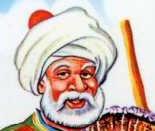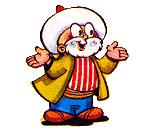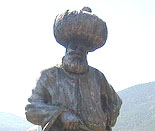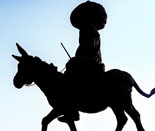 |
 |
| |
|
| |
NASREDDIN HODJA (NASRETTIN HOCA) and HIS TEACHING STORIES

|
| |
The many spelling variations for Nasreddin
include: Nasreddin, Nasr-ud-Din, Nasr-id-deen, Nasr-eddin, Nasirud-din,Nasrettin,
Nasrudin, Nasr-Eddin, and Nasr-Ed-Dine.
The many spelling variations for Hodja include:
Hodja, Hodscha, Hoca, Chotza, Khodja, Hoxha and Khoja.
Nasreddin Hodja is truly a household name in Turkey.
A ubiquitous cultural figure whose anecdotes are invoked with
remarkable occurrence by authors, speakers, and ordinary people
equally. Most of his gags and punchlines are used like proverbs.
These proverbs reflect Turkish conversations which are often
interlarded with suggestions to the infinite tales of the Hoca.
Along with Aesop, who was born in a place near Ankara, and is the
most tough folk philosopher and humorist to become known in
Anatolia.
Few precious things are known about Nasreddin Hodja's life. According
to some account, He lived probably in the 13th century and some
authorities place him in the 14th or even the 15th century. He was
most likely born in Sivrihisar near Eskisehir, and had his schooling
either in Konya or Aksehir where he spent many years serving as a
preacher, religious teacher, and judge. He died and was buried in
Aksehir where his "catacomb" becomes a suitable view of silence. As
you look at his mausoleum, all its walls are missing and only the
Iron Gate remains whole with a huge padlock hanging on it. At this
site, Nasrettin Hoca's devotees perform their humorous memorial ceremony each
year.
|
 |
|
| |
|
|
| |
 |
|
| |
|
|
| |
Being a judge for several years made Nasreddin
Hodja known to be Nasuriddin Hoca, which then becomes Nasreddin Hoca
and gives familiarity to his noble name. The name Nasreddin also
defines to be Helper of the Faith” which really descries the man's
personality and humor. He was a positive person who sustained faith
in life and in human beings. In addition to his positive traits,
Nasreddin Hodja lived to help others to do wondrous things in life.
No wonder the common people of Anatolia have always remembered him
as a fat husky, sociable man - like Falstaff or Bottom. He is said
to have lived at a time of war and instability, but he accepted life
stoically, that turns suffering into humor and tears into smiles. He
refused to accept the miserable litanies of the poets among his
generation, but he have preference to states gentle words and offer
his waywardness and fanciful railleries to give relief to the
suffering people of his day that will last until the next
generations. Nasireddin Hock’s importance as the humorist has been
long-lasting. In fact, his "lore of laughter" has grown with the
centuries - even in our time. Many of his authenticated stories have
been - and are being - ascribed to him, in respect of his status as
the creator, and the incarnation of Turkish folk humor.
Nasreddin Hoca’s significance gone beyond not in the incidents
narrated themselves, but in the meaning behind his witty words, and
their ironic or amusing elements. Some studies about his words show
an expression of the lifestyle, sense of humor and slightly
satirical manner of the people of Anatolia, and that his words are
not to be seen as limited to one particular period or time alone.
The anecdotes about him give emphasis on love, satire, praise and
gentle mockery.
|
 |
|
| |
|
|
| |
 |
|
| |
His sense of humor and self-mockery shows his
resistance to the stricter elements of Islamic law. He use words of
contradictory combined with wise, ignorant, pleasant, cunning,
reserved, astonished, tactless, apprehensive and striking words to
express his unfavorable conviction to Islamic law.
One particular feature of anecdotes that give impact to his
personality is his delight that puzzled others. These reflect the
attitude of the people of Anatolia to particular situations, and are
actually the crop of their thoughts. Nasreddin Hoca therefore
becomes known as to be the reflection of humorous stories and
feelings of the people. Nasreddin Hoca existence is full of wisdom
and intelligence that offers loud voices which speaks about fair and
just society.
Another important element in Nasreddin Hodja teaching stories is the donkey
that gives a manifestation of the people’s feelings, and also gives
a picture of his vehicle of satire itself. The horse has no place in
those humorous tales created by the imaginary thoughts of Anatolia.
The donkey, with its suffering and pain, the blows that are
inflicted on it, is the most extensive representation of human lives
in those days. No donkeys are to be found in humorous tales from the
palaces. Such people ride on horses. Another contradiction is to be
seen in this context, is the humorous and the more mocking element
of such tales.
Nasreddin Hoca is a folk philosopher with excellence. Many of his
stories, as lessons in moral conduct and as witty practical jokes,
give critical annotations on stereo typed social thought and
behavior with points of view about imaginative alternatives. His
wisdom influences all sections of society. And he also led to the
birth of other humorous tales that reflects the mindsets of very
different areas. For an example, Bektashi, that reflects the popular
version for strict Shariah Law.
Every year, between July 5-10, International Nasreddin Hodja
Festival is organized in Aksehir where his tomb is. To keep Hodja
character alive, Turkish writers and artists have used it in drama,
in music, in movies (especially cartoons), in comic strips, in
paintings.
After reading the stories in this book, we think that you, too, will
believe that Hodja will be living for generations to come. Just as
Hodja did, may be you, too, will answer when asked "What do they do
with the old full moons?", "They cut them up into small pieces and
make stars!.."
|
|
| |
FEW SAMPLES OF HIS TEACHING STORIES:
Allah's House
A beggar knocked on the Hodja's door and said, "Allah has directed
me to this house for a good meal."
"I am sorry, but you have the wrong house," replied the Hodja
Effendi. Then pointing to a nearby mosque, he continued, "Allah
lives over there."
Hodja and The God.
The Hodja was travelling from a long way away, he got tired
and decided take a rest under a tree. Then he prayed:
My God, he said. Send me a donkey please !
A few minutes later, he saw a man riding on a horse and leading a
young donkey.
The man came nearer, stopped beside him and shouted:
You, leprous man! Instead of starving there, come on carry the
donkey, it is tired.
Although the Hodja said, that he was also tired, the tyrannical man
beat him with a stick and so the poor Hodja took the donkey on his
shoulders.
Then the man on the horse proceeded on his way. Every time the Hodja
slowed down, the man beat him and after many miserable hours, they
reached the town, where the man let the Hodja go, without thanking
him.
Then the Hodja Nasreddin fall down on the earth and slept many
hours. When he awakened he murmured
Oh, God! What happened? Was it that I couldn't explain, or that you
couldn't understand?
Pumpkin and Walnut Tree
One hot day, Nasruddin was taking it easy in the shade of a
walnut tree. After a time, he started eying speculatively, the huge
pumpkins growing on vines and the small walnuts growing on a
majestic tree.
- Sometimes I just can't understand the ways of God! he mused. Just
fancy letting tinny walnuts grow on so majestic a tree and huge
pumpkins on the delicate vines!
Just then a walnut snapped off and fell smack on Mullah Nasruddin's
bald head. He got up at once and lifting up his hands and face to
heavens in supplication, said:
- Oh, my God! Forgive my questioning your ways! You are all-wise.
Where would I have been now, if pumpkins grew on trees!
Cleverest man in the world.
At the time of the Nasreddin Hodja, some clever and
educated men were searching for an intelligent man, who could answer
their three questions. They traveled through the whole world and
then came to Aksehir Turkiye.
They asked:
Who is most intelligent man in this town?
Of course the people of the town brought the Hodja to the three men
and they began to ask.
First question: Where is the central point of the world?
The Hodja's donkey was with him. So he pointed to his donkey. Where
the front legs of my donkey are, there is the middle point of the
world. How can you prove that? asked one of the men.
If you don't believe, you can measure it, the Hodja said. Measuring
did not seem a good idea to them, so they went on to the next
question.
How many stars are on the sky?
The Hodja replied without hesitation:
As many as the hairs on my donkey's mane.
The three men laughed. If you don't believe it, said the Hodja, you
can count them.
The foreigners understood that they couldn't get a correct reply and
one of them asked:
Can you say how many hairs are in your donkey's mane?
Oh, yes, said the Hodja. There are exactly the same number of hairs
as you have in your beard. Now don't tell me, that you don't believe
that because I can prove it by pulling one hair from your beard and
one from the donkey's mane. When we pull each hair out one after the
other, you can see at the end that there are the same number of
hairs.
The three men went back to their country and told everyone that the
cleverest man in the world lived in Akshehir.
A forty year old vinegar
One day, a neighbor said to the Hodja:
Have you a vinegar that is forty years old?
Yes I have, replied the Hodja.
Can you give me a little, asked the neighbor.
If I gave a little to everybody asking for it, said the Hodja, It
would not be forty years old!
Bread and Yoghurt
One day the Hodja had 10 para(money) to buy himself lunch with. He
first went into the bakery, handed 5 para over to the baker and
asked for a bread. As the baker gave Hodja the bread he asked for
his money.
"I just paid you" Hodja said.
"No, you didn't pay me." the baker insisted, "I didn't see any
money." After a few minutes of debate, not being able to convince
the bully baker, Hodja had to give in. He took out his other 5 para
and gave it to him.
Left with no money at all, Hodja next entered the grocery store. He
asked for a jar of yogurt. When the grocer asked for his money,
Hodja claimed that he had just given him a 5 para. The good natured
grocer had been a little preoccupied all morning, so he easily
believed that he must have indeed taken the money and forgotten it.
Hodja took his provisions and sat under a tree. Before starting to
eat his lunch, he raised his head towards the sky and said "Sublime
Allah, You know what really happened, You take the 5 para from one
and give it to the other."
We are even
One day, Hodja went to Turkish bath but nobody paid him much
attention. They gave him an old bath robe and a towel. Hodja said
nothing and on his way out he left a big tip. A week later, when he
went back to the same bath, he was very well received. Everybody
tried to help him and offered him extra services. On his way out, he
left a very small tip.
"But, Hodja," they said,
"Is it fair to leave such a small tip for all the attention and
extra services you received?"
Mullah Nasreddin answered,
"Today's tip is for last week's services and last week's tip was for
today's services. Now we are even."
|
|
| |
|
|
<-Back |
|
|
 |
|
